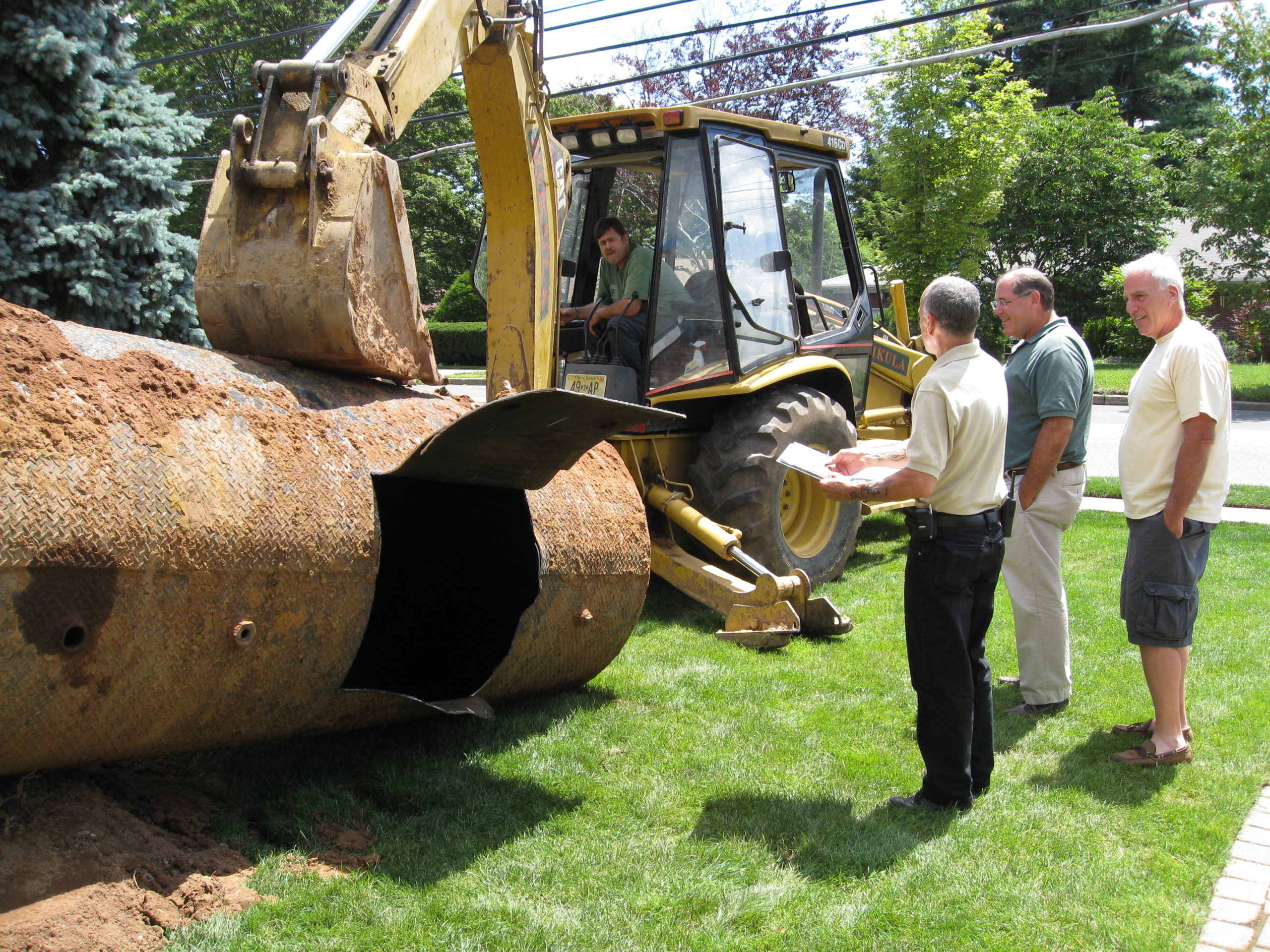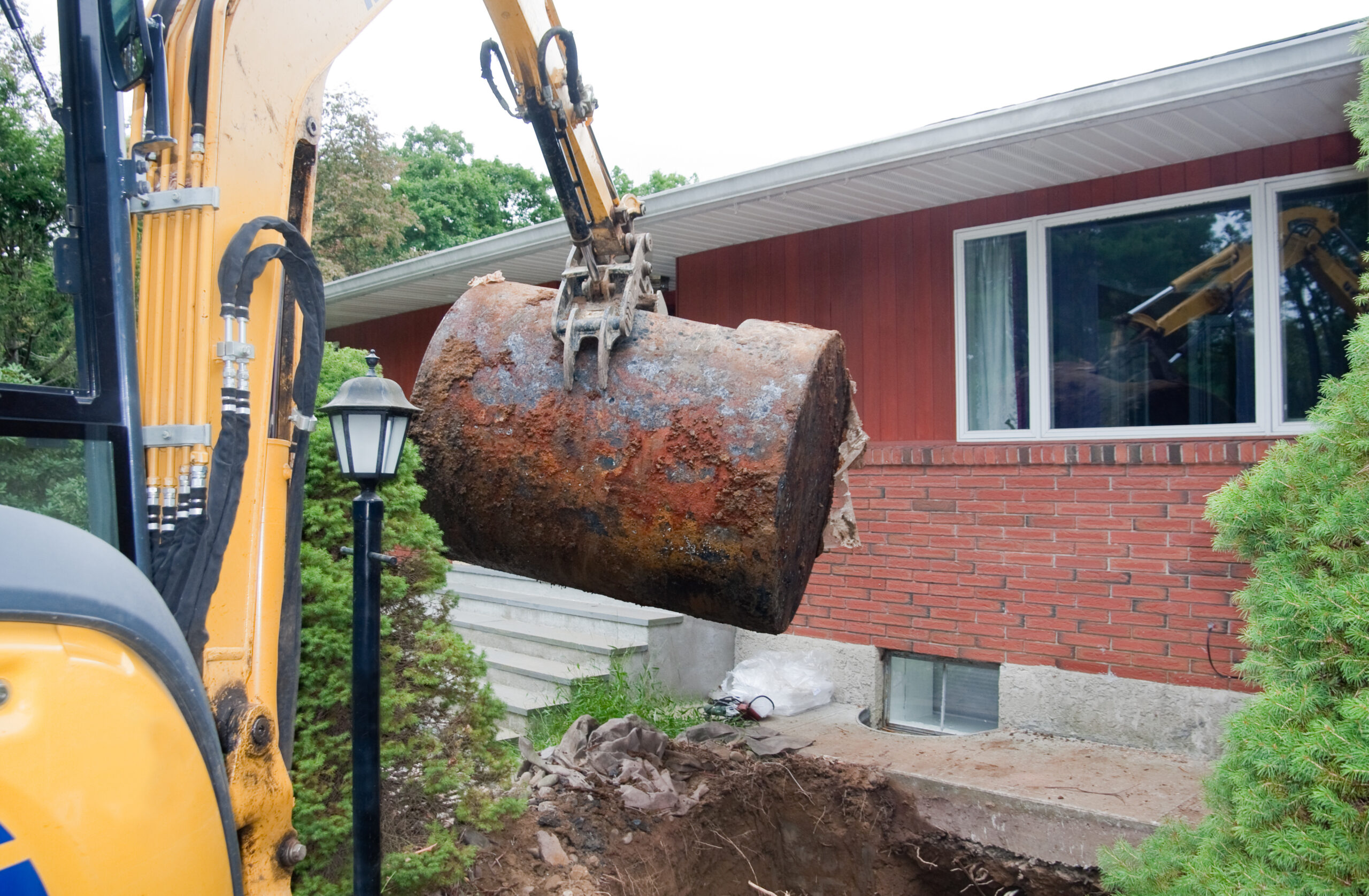When Do You Need Your Soil Tested If You’re Removing an Oil Tank?
Oil tank removal requires specific steps to safely pull out the tank without contaminating the surrounding environment. If the tank is old, then it might have started leaking oil into the ground, which is when you should consider soil testing as a way to monitor the safety of the site.
Not only are oil tank removal and soil testing essential steps to comply with environmental regulations, but they also help to protect your property value and minimize the risk of more serious problems in the future. In fact, some property buyers might ask for soil testing results before closing on the purchase. If you are proactive about testing and soil remediation now, then it can minimize delays when you decide to sell the property in the coming years.
When you are working with a trusted contractor, we will be able to provide recommendations about the best way to remove the tank. This proactive approach helps to prevent larger issues, such as legal problems or costly cleanups.
Why Soil Testing Is So Important Following Oil Tank Removal
When an underground oil tank is removed, it’s typical for the contractor to recommend that you engage an environmental firm to perform a visual inspection and soil sampling. The goal is to confirm that the area is free from contamination. If the test comes back showing that existing oils are in the soil, then we can put together a soil remediation plan in conjunction with the environmental firm to ensure the health and safety of everyone on the site.
While performing soil testing might seem like a simple step, the reality is that soil contamination can have a long-term impact on the environment. Additionally, oil residue in the soil can pose health risks to humans and animals in the area.
Keep in mind that an oil spill can also affect groundwater, which makes it a public health hazard and a legal issue that you will need to deal with. Not only this, but it’s unlikely that the town will pass the tank inspection for the removal if there is evidence of a leak; it’ll be required for you to engage an environmental firm to begin testing and perform remediation before they’ll pass the tank removal. Early testing and proactive soil remediation are the best solutions to help you avoid delays.
Early detection of contaminated soil is a great solution to allow timely remediation. We recommend that you start your cleanup project as soon as possible, helping to prevent further spread and damage in the area. If you delay testing and the contamination is found later, then it’s likely that your remediation costs will be much higher in the future.
Two Instances When You Would Absolutely Need Your Soil Tested
How do you know if it’s time for soil testing? The best solution is to talk to an experienced contractor for personalized recommendations. These are two conditions when we often recommend soil testing.
A Leak Was Found in the Oil Tank
If the tank was removed and testing uncovers a leak, then we recommend thorough testing to determine the extent of the contamination. It’s possible for leaking oil to seep into the ground and affect the surrounding areas. Not only is your property at risk, but an untreated leak can cause damage to nearby properties as well.
Keep in mind that the sooner a leak is identified, the better chance you have of cleaning up the issue before it escalates. Early intervention is key, which is why we always recommend immediate soil testing if a leak is found in your oil tank. This testing will help us determine the extent of the contamination and damage.
The Oil Tank Was Not Decommissioned Properly
Another reason why we might recommend soil testing is if the oil tank was improperly decommissioned. If the proper procedures are not followed, then it is possible that oil can be left behind in the soil. We can test the soil to determine if any contamination remains after an old oil tank is removed.
Testing is an important step because it gives you the peace of mind to know that all oil tank issues are resolved fully, helping to protect your property and the environment.
How Soil Testing Works
Specific steps need to be followed to ensure accurate results from soil testing. First, soil samples are taken from the area near where the tank was located in the ground. It’s important to collect samples from different depths in the ground.
Next, the soil samples are transferred to a laboratory where they are tested to determine if there are contaminants, including oil, in the soil. If the soil is clean, then there is nothing else that we need to do. But if the soil testing comes back showing contamination, then it might be necessary to complete further remediation.
Work With a Trusted New Jersey Oil Tank Removal Contractor
When you are removing an old oil tank, then it’s essential that you are partnered with an experienced contractor who will ensure that all of the oil is removed safely without contaminating the soil. Make sure you are working with a trusted provider so that everything is handled professionally and according to industry regulations.
Our team is here to help with anything that you need, including soil testing and remediation steps. We will make sure that your property is safe and that all compliance details are managed every step of the way. You deserve to have peace of mind, knowing that the job will be done right the first time.
For more information about available services, contact us at Mikula. Not only do we offer residential tank removal, commercial oil tank removal, and oil tank scans, but a variety of other site services are also available. We are always here to help!
What Happens If Your Oil Tank Has a Leak?
If you have an oil tank, when was the last time it was inspected for leaks or maintenance needs? Often, the oil tank is out of sight, so property owners do not typically complete routine or regular inspections. But if the tank is leaking, then it’s essential to catch these issues in the earliest stages so you can schedule repair services or even oil tank removal if necessary.
The reality is that if you have oil leaking, then it can cause some serious environmental issues. Both the soil and water in the area might be contaminated, which poses health risks, safety concerns, and potential issues with the local ecosystem.
If you need help with an oil tank removal, then our team at Mikula is just a phone call away!
Potential Problems from an Oil Leak
Every property owner with an oil storage tank on-site needs to understand the severe consequences and damage that can occur from an oil leak. If the oil continues leaking and you delay an oil tank removal, then some of the issues that might occur include:
- Environmental Hazards: Even small leaks can take a toll on the environment because of the contamination to the soil and water.
- Home Damage: If the oil is seeping into the utility room or basement, then it can lead to expensive cleanup and possibly restorations because your home has been damaged.
- Health Risks: People near the oil leak could experience negative health effects because of direct exposure or inhaling fumes from the oil.
- Legal or Financial Liabilities: There is a possibility you could be facing potential legal and financial issues such as fines or remediation costs, especially if the leak has an environmental impact.
- Fire Risk: The presence of leaking oil can increase the likelihood of a local fire, putting the homes and other structures in the area at risk.
Telltale Signs Your Oil Tank Has a Leak
How can you tell if a leak is happening in your above-ground or underground oil tank? If the tank is underground, then visual inspections are difficult. Luckily, there are a few other signs that you might be dealing with a leak or other issues with the tank:
- Visible Oil Stains: Check the area where the tank is located to see if you can find any visible oil stains. An above-ground oil tank might have visible stains on the outside of the tank or on nearby surfaces. Or, you might see soil discoloration if the tank is below ground.
- Drop in Oil Level: Have you recently noticed a sudden and unexplained drop in the oil level? If you don’t have a corresponding increase in heating usage, then it could be an indication of an oil leak that needs to be fixed.
- Strong Smell: Pay attention if you are noticing a strong smell in your home or near the tank. Oil will create a unique smell, so if you are noticing this scent then it might be time to schedule an oil tank inspection.
- Dead Vegetation: When oil starts leaking into the soil, it can kill the vegetation in the area. So, if you notice dead or dying vegetation near the tank location, then it could be a sign that the tank is leaking.
- Rust or Corrosion: If you can see the tank, check for other signs of damage on the surface, such as rust, corrosion, or wet spots on the exterior.
Some of these signs of oil leaking can be identified with a DIY inspection. But it’s always smart to call a professional team for further investigation and personalized recommendations.
Who to Call If Your Oil Tank Has a Leak?
If you suspect that you have oil leaking from your tank, who is the best provider to call? A licensed environmental firm is a great resource if you suspect there is a leak in your oil tank. The first step will be to evaluate and confirm whether there is a leak or not.
Also, it’s smart to notify your service provider or oil company so that oil delivery is paused until you can resolve the issue. The company might also have recommendations for fixing the problem.
If there is damage to your home, then reach out to your homeowner’s insurance to find out if you have coverage available for the remediation that will be needed.
In the rare (but possible) situation where the oil leak is causing a local fire, then it’s essential to dial 911 immediately so the fire department can handle the situation.
Finally, if the oil leak is spreading and significant, then it’s best to reach out to local environmental authorities to avoid further damage or potential fines.
So You’ve Discovered Your Oil Tank is Leaking - What’s Next?
If you’ve discovered that your oil tank is leaking first you will want to speak with an environmental firm to confirm that there really is a leak. For example, at Mikula Contracting we regularly work with environmental firms on projects involving oil tanks that need to be removed. Additionally, if your project requires soil remediation that would also be addressed during the process.
The goal is to stop the leak as soon as possible while also minimizing the complications and environmental impact. Depending on the situation, It might be recommended to remove the oil tank, or maintenance might be sufficient to resolve the situation.
Each situation is unique, which is why there isn’t a one-size-fits-all solution if you have oil leaking from your tank. It’s important that you consult with a professional team to ensure you are following the best strategy to resolve the problem and avoid more issues in the future.
Call Mikula Contracting to Remove Your Leaky Oil Tank
Do you need help with an oil tank removal? Then contact our experienced team at Mikula for more information. We are here to help with anything you need, offering full-service solutions, including residential tank removal, cleanup services, and more.

